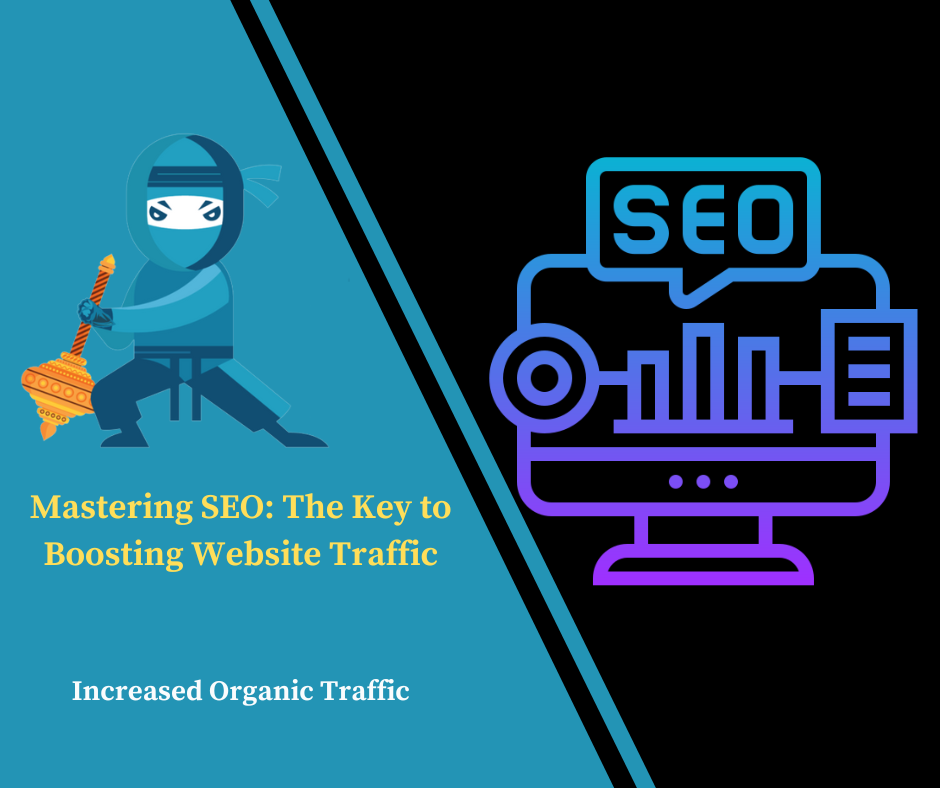Mastering SEO: The Key to Boosting Website Traffic
In the digital age, mastering SEO (Search Engine Optimization) has become essential for anyone looking to grow their online presence. SEO is more than just a buzzword—it is a long-term strategy that drives organic traffic, improves website visibility, and ultimately boosts conversions. If you’re looking to understand how to enhance your website’s ranking and performance, you’ve come to the right place. This guide will provide you with key insights into mastering SEO, demonstrating how it can be the ultimate key to boosting website traffic.
What Is SEO?
At its core, SEO is the process of optimizing your website to rank higher on search engine results pages (SERPs). This involves using relevant keywords, creating quality content, and ensuring your website is user-friendly. Search engines, like Google, rank pages based on how well they align with what users are searching for. The better your SEO, the more likely your website will appear at the top of the search results.
Why Is SEO So Important for Website Traffic?
SEO is critical for driving traffic to your website because it helps you get found online. Studies show that 75% of users never scroll past the first page of search results, meaning the higher you rank, the more visitors you are likely to receive. Organic traffic, driven by SEO, is also more valuable than paid advertising because it attracts users who are actively looking for your content or services.
Now, let’s break down how you can master SEO and boost your website traffic.
1. Keyword Research: The Foundation of SEO
The first step in mastering SEO is conducting thorough keyword research. Keywords are the phrases or terms people type into search engines when looking for specific information. By identifying and using the right keywords, you can make sure your content matches the intent of your target audience.
How to Perform Keyword Research:
Use tools like Google Keyword Planner, SEMrush, or Ahrefs to identify keywords relevant to your business.
Focus on long-tail keywords—these are more specific phrases that often have lower competition and higher conversion rates.
Analyze your competitors to discover which keywords they are targeting.
Once you’ve gathered a list of relevant keywords, integrate them naturally into your content. Avoid keyword stuffing, as it can harm your ranking. Instead, focus on providing value while using keywords strategically in your headings, titles, and throughout the text.
Also read: How to Drive More Traffic to Your Website: A Complete Guide
2. Create High-Quality, Engaging Content
Search engines prioritize websites that provide useful, high-quality content. The content on your website should be informative, well-researched, and tailored to your audience’s needs. This is a critical aspect of mastering SEO: not only do you need to have the right keywords, but the overall content must engage and retain visitors.
Content Tips:
Write content that answers the questions your target audience is asking.
Keep your content up-to-date by regularly updating or refreshing older posts.
Use a variety of content formats such as blog posts, videos, infographics, and podcasts to keep your audience engaged.
Quality content will naturally attract backlinks from other reputable websites, which is another important factor in SEO. Backlinks act as a vote of confidence, signaling to search engines that your website provides valuable information.
3. On-Page SEO: Optimize Individual Pages
On-page SEO refers to the optimization of individual pages on your website to rank higher in search results. This involves optimizing meta titles, descriptions, headers, and URLs. Here’s how you can master on-page SEO:
Title Tags: Ensure that your page titles are clear and contain your target keywords. The title should be enticing and descriptive to encourage users to click through.
Meta Descriptions: Meta descriptions give users a brief preview of your page’s content. They should be compelling, and concise, and include relevant keywords to increase the chances of click-throughs.
URL Structure: Your URLs should be simple and include your primary keyword. Avoid using long, complicated URLs.
Additionally, using proper header tags (H1, H2, H3) helps search engines understand the structure of your content and makes it easier for users to navigate.
4. Optimize for Mobile and Speed
With more than half of all internet traffic coming from mobile devices, optimizing your website for mobile use is essential. A mobile-friendly design is now a ranking factor for Google, so websites that aren’t optimized for mobile risk being penalized.
Additionally, site speed plays a significant role in both SEO and user experience. Studies have shown that users are likely to abandon a site that takes more than 3 seconds to load. To boost your website traffic, make sure your site loads quickly by compressing images, using a content delivery network (CDN), and minimizing code.
5. Build High-Quality Backlinks
Backlinks—links from other websites to yours—are one of the most important ranking factors in SEO. They indicate to search engines that your content is valuable and authoritative. However, not all backlinks are created equal. Links from reputable, high-authority websites are far more valuable than links from less-known sources.
How to Build Backlinks:
Create shareable, high-quality content that others will naturally want to link to.
Reach out to influencers or bloggers in your industry to see if they’ll feature your content.
Guest posts on reputable websites in your niche to gain valuable backlinks.
6. Track Your SEO Performance
To truly master SEO, you need to track your performance regularly. Use tools like Google Analytics and Google Search Console to monitor your organic traffic, keyword rankings, and user behavior. This will help you identify areas for improvement and allow you to make data-driven decisions.
SEO is an ongoing process, and regularly evaluating your performance is key to maintaining and improving your rankings.
FAQ
What is SEO and why is it important?
SEO stands for Search Engine Optimization. It is the process of optimizing your website to rank higher on search engine results pages, which helps increase website traffic, visibility, and conversions. SEO is important because most online users rely on search engines to find information, products, and services.
How does keyword research help with SEO?
Keyword research helps you identify the phrases and terms people use when searching for specific content. By using relevant keywords strategically in your content, you increase the likelihood that search engines will rank your website higher in search results, driving more traffic to your site.
What are long-tail keywords and why should I use them?
Long-tail keywords are longer and more specific keyword phrases. They tend to have less competition and a higher conversion rate because they attract more targeted traffic. Using long-tail keywords can improve your chances of ranking higher in search results.
How can I improve my website’s loading speed?
To improve website speed, compress images, use a content delivery network (CDN), minimize HTTP requests, and optimize your code by removing unnecessary scripts and files. Faster websites provide a better user experience and tend to rank higher in search engine results.
How long does it take to see results from SEO?
SEO is a long-term strategy, and it typically takes several months to see significant results. However, consistent effort in optimizing your website can lead to sustainable traffic growth over time.
Conclusion
Mastering SEO is the key to boosting website traffic. It requires a mix of keyword research, content creation, on-page optimization, mobile optimization, backlink building, and continuous performance tracking. By following these strategies, you can enhance your website’s visibility, attract more visitors, and ultimately grow your business.SEO is not a one-time effort; it’s a long-term investment that, when done correctly, can deliver sustainable traffic growth. Start mastering SEO today, and watch as your website traffic soars.








